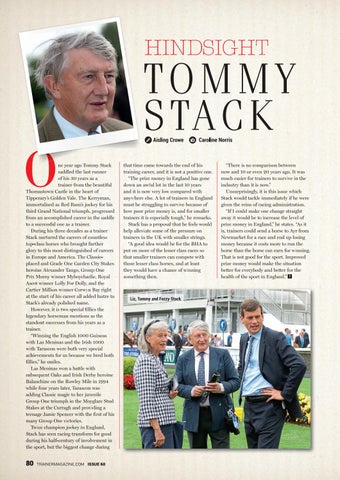O
ne year ago Tommy Stack saddled the last runner of his 30 years as a trainer from the beautiful Thomastown Castle in the heart of Tipperary’s Golden Vale. The Kerryman, immortalised as Red Rum’s jockey for his third Grand National triumph, progressed from an accomplished career in the saddle to a successful one as a trainer. During his three decades as a trainer Stack nurtured the careers of countless top-class horses who brought further glory to this most distinguished of careers in Europe and America. The Classicplaced and Grade One Garden City Stakes heroine Ale lexander Tango, Group One Prix Morny win inner Myboycharlie, Royal Ascot win inner Lolly For Dolly, and the Cartier Million wi winner Corwy win wyn Bay right wyn at the start of his career all added lustre to Stack’s already polished name. However, it is two special fi fillies the fil legendary horseman mentions as the standout successes from his years as a trainer. “Winning the English 1000 Guineas wit ith Las Meninas and the Irish 1000 wit ith Tarascon were both very special achievements for us because we bred both fillies,” he smiles. fil fi Las Meninas won a battle wit ith subsequent Oaks and Irish Derby heroine Balanchine on the Rowley Mile in 1994 while four years later, Tarascon was adding Classic magic to her juvenile Group One triumph in the Moyglare Stud Stakes at the Curragh and provid iding a teenage Jamie Spencer wiitth the fi first of his fir many Group One vi victories. vic Twic ice champion jockey in England, Stack has seen racing transform for good during his half-century of involvement in the sport, but the biggest change during
80
TRAINERMAGAZINE.COM ISSUE 60
TOMMY S TA C K Aisling Crowe
Caroline Norris
that time came towards the end of his training career, and it is not a positive one. “ The prize money in England has gone down an awf wful lot in the last 10 years wfu and it is now very low compared wi with wit anyw ywhere else. A lot of trainers in England ywh must be struggling to survi vive because of viv how poor prize money is, and for smaller trainers it is especially tough,” he remarks. Stack has a proposal that he feels would help allevia iate some of the pressure on trainers in the UK wiitth smaller strings. “A good idea would be for the BHA to put on more of the lesser class races so that smaller trainers can compete wiitth those lesser class horses, and at least they would have a chance of wi winning win something then.
Liz, Tommy and Fozzy Stack
“ There is no comparison between now and 10 or even 20 years ago. It was much easier for trainers to surviv ive in the industry than it is now.” Unsurprisingly, it is this issue which Stack would tackle immediately if he were given the reins of racing administration. “If I could make one change straight away it would be to increase the level of prize money in England,” he states. “As it is, trainers could send a horse to Ayr from Newmarket for a race and end up losing money because it costs more to run the horse than the horse can earn for wi winning. win That is not good for the sport. Improved prize money would make the situation better for everybody and better for the health of the sport in England.”
